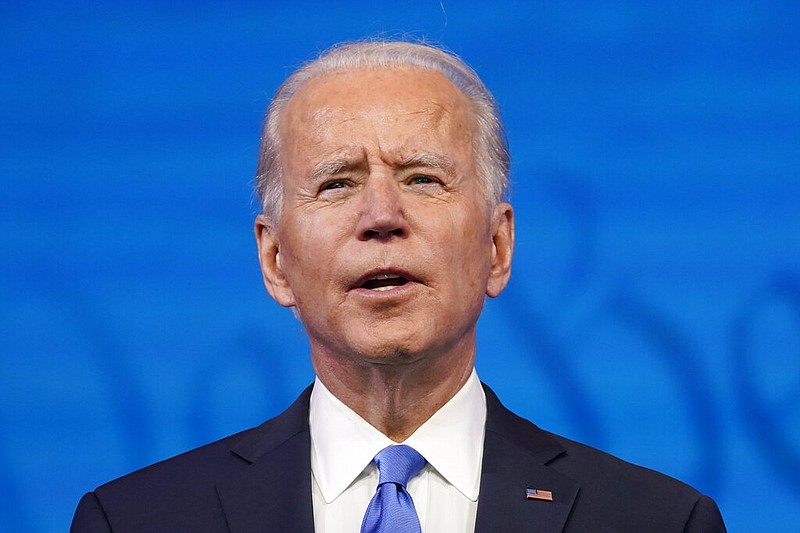A federal judge in Texas has dismissed a lawsuit by Rep. Louie Gohmert, R-Texas, that sought to overturn the presidential election, saying neither the congressman nor his allies have legal standing to pursue the case.
The judge's Friday night ruling tosses out what many election law experts considered a far-fetched theory to challenge the formal mechanism by which President-elect Joe Biden will be affirmed as the winner of the race for president.
U.S. District Judge Jeremy Kernodle issued an order dismissing the case because, he found, neither Gohmert nor his fellow plaintiffs have a sufficient legal stake in the process to justify the lawsuit. Kernodle was nominated to the federal bench by President Donald Trump.
The judge's ruling comes less than 12 hours after lawyers for Gohmert filed court papers arguing that Vice President Mike Pence has far more power than the government claims to alter the outcome of the presidential election. It was not immediately clear if Gohmert's legal team plans to appeal the decision.
In response to a Justice Department request to reject the suit, the Friday filing by Gohmert's legal team accused the government of trying to "hide behind procedural arguments." Gohmert's lawyers contended that arguments made by the Justice Department and Congress -- that the suit upends long-established procedures and that Pence is an inappropriate target for the suit -- are unfounded.
[Gallery not loading above? Click here for more photos » arkansasonline.com/12challenge/]
"They say that the Vice President, the glorified envelope-opener in chief, has no authority to preside over anything else or to decide anything of substance or to even count the votes in those weighty envelopes. He is only the envelope-opener," Gohmert's filing states.
Gohmert claimed the vice president has the power to effectively pick the next president during the formal recording of electoral college votes by Congress on Wednesday. Pence oversees that ceremony and, as president of the Senate, has the power to declare Biden electors in a handful of key states invalid and instead recognize electors supporting Trump, the filing contends.
Gohmert and a number of Republicans in Arizona filed the suit in Texas, arguing that an 1887 law governing how Congress certifies presidential elections is unconstitutional. They argue that the Constitution gives the vice president discretion to determine which states' electors are valid for choosing the president of the United States.
While experts agree that 19th century law is vague and confusing, it has never before been challenged; it has been accepted by officials in both parties for more than 130 years as establishing a process in which voters choose electors who choose the president. This year, 81 million voters supported Biden, earning him 306 electoral college votes to Trump's 232.
In a Thursday night filing, a Justice Department lawyer wrote on Pence's behalf that the case is "a walking legal contradiction," because Gohmert has sued Pence seeking to give Pence more power. If Gohmert and his allies want to make such a claim, the Justice Department argued, they should sue Congress, not Pence.
Lawyers for the House of Representatives also asked the judge to reject the Gohmert suit, arguing that it called for "a radical departure from our constitutional procedures and consistent legislative practices" and would "authorize the Vice President to ignore the will of the Nation's voters."
Pence was caught in the middle as Trump's election challenge splits the Republican Party before a joint session of Congress confirms Biden as the winner.
Senate Majority Leader Mitch McConnell is urging Republicans not to try to overturn the election, but not everyone is heeding him. Sen. Josh Hawley of Missouri vows to join House Republicans in objecting to the state tallies. On the other side of the party's split, GOP Sen. Ben Sasse of Nebraska warns such challenges are a "dangerous ploy" threatening the nation's civic norms.
To ward off a dramatic unraveling, McConnell convened a conference call with Republican senators Thursday specifically to address the coming joint session and logistics of tallying the vote, according to several Republicans granted anonymity to discuss the private call.
The Republican leader pointedly called on Hawley to answer questions about his challenge to Biden's victory, according to two of the Republicans.
His office did not respond to a request for comment.
Sen. Pat Toomey, R-Pa., who has acknowledged Biden's victory and defended his state's elections systems as valid and accurate, spoke up on the call, objecting to those challenging Pennsylvania's results and making clear he disagrees with Hawley's plan to contest the result, his office said in a statement.
McConnell had previously warned GOP senators not to participate in raising objections, saying it would be a terrible vote for colleagues. In essence, lawmakers would be forced to choose between the will of the outgoing president and that of the voters.
Several Republicans have indicated they are under pressure from constituents back home to show they are fighting for Trump.
Hawley became the first GOP senator this week to announce he will raise objections when Congress meets to affirm Biden's victory in the election, forcing House and Senate votes that are likely to delay the final certification of Biden's win.
Information for this article was contributed by Devlin Barrett of The Washington Post; and by Lisa Mascaro, Mary Clare Jalonick and Aamer Madhani of The Associated Press.
